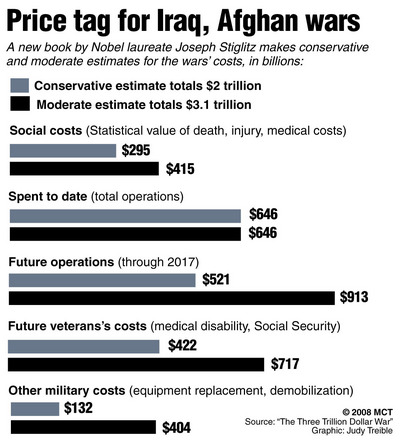
 Nobel prize winning economist Joseph Stiglitz predicts the Iraq war will cost the United States $3 trillion. Nouriel Roubini, the economist who predicted today’s financial crisis in 2006, predicts the U.S. will suffer its worst recession in 40 years, lasting up to two years with 9% unemployment and another 15% drop in housing prices. He predicts we are seeing only the first round of government injection of funds into the finance system.
Nobel prize winning economist Joseph Stiglitz predicts the Iraq war will cost the United States $3 trillion. Nouriel Roubini, the economist who predicted today’s financial crisis in 2006, predicts the U.S. will suffer its worst recession in 40 years, lasting up to two years with 9% unemployment and another 15% drop in housing prices. He predicts we are seeing only the first round of government injection of funds into the finance system.
Throughout the Iraq war and occupation peace activists have pointed to the cost of war as one reason why the occupation must end. The “cost of war” clock is almost universal on anti-war sites. But now, with reports that the $1.8 trillion spent on bailing out the U.S. finance system is not enough to save the U.S. economy, the cost of war and the military budget must be reconsidered. The U.S. will need to choose – continued occupation or creating a new economy.
Unlike the depression which ended in part because of World War II, this time military spending is contributing to economic demise. Military spending takes money from the rest of the economy and prevents a federal budget that invests in re-tooling the economy. Spending hundreds of billions on the Iraq and Afghanistan war, and hundreds of billions more annually on military spending is one reason why the U.S. economy is faltering. The DoD is expected to put forward an even bigger budget request before the next president takes office. This will force the next president to quickly confront whether the military continues to dominate U.S. foreign policy and the U.S. budget.
Read further in Now the Cost of War Really Matters by Kevin Zeese.
Saturday, October 18, 2008
U.S. to Choose - continued occupation or creating a new economy.
Subscribe to:
Post Comments (Atom)





No comments:
Post a Comment